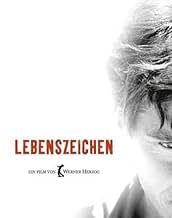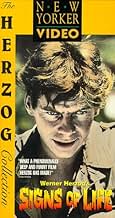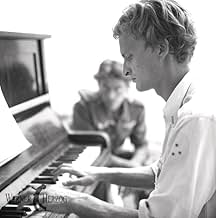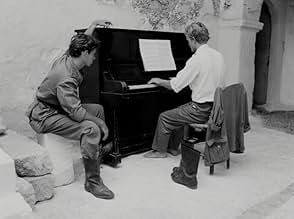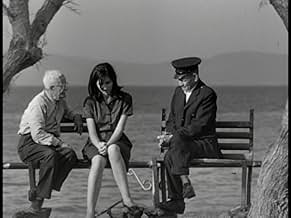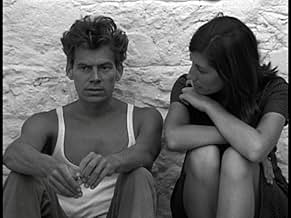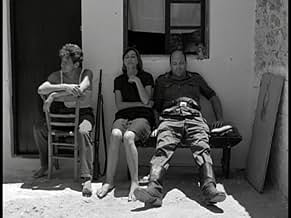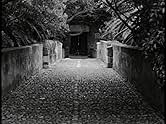VALUTAZIONE IMDb
7,0/10
2625
LA TUA VALUTAZIONE
Aggiungi una trama nella tua linguaThree wounded soldiers are removed from battle and given the task of looking after a fortress in a small coastal town. However, the pressures of isolation begin to take their toll on the men... Leggi tuttoThree wounded soldiers are removed from battle and given the task of looking after a fortress in a small coastal town. However, the pressures of isolation begin to take their toll on the men.Three wounded soldiers are removed from battle and given the task of looking after a fortress in a small coastal town. However, the pressures of isolation begin to take their toll on the men.
- Regia
- Sceneggiatura
- Star
- Premi
- 2 vittorie e 2 candidature totali
Werner Herzog
- Soldat
- (non citato nei titoli originali)
Recensioni in evidenza
Werner Herzog's first film is a view into the mindset of the soldier who goes over the brink, but unlike many films that might explore the concept, or even Herzog's own later, arguably greater, Woyzeck, Signs of Life is about a man engulfed by the location. The setting is interesting right away; a stone fortress that men who have been wounded or just put on leave are guarding on a remote Greek island during WW2 (of course, we're never told this, which is appropriate, one can take a guess as to the significance of Herzog's POV as part of the New German cinema), and aside from the cockroaches and painting doors, there's not much to do. The mundane becomes engulfing, even as there's little things to do on the island. It's always bubbling under the surface, and as the days pass and things start to grow more aimless, Stroszek (Peter Brogle, with the kind of eyes and demeanor Kubrick would've loved to film) distances himself, sets of fireworks in his hands, and snaps one day out on patrol.
If anyone knows Herzog, the tale of a man going "berserk", as one officer says in this film of the main character, this shouldn't be seen out of the ordinary. Herzog has always tried to explore not so much of the precise 'whys' of the snap, or the break under pressure, or society's role or those around in personal quarters. Of course it's suggested a lot of the time, but in the case of Signs of Life we see much of the insanity in very long shots, with Stroszek going mad in the last twenty minutes on top of the fortress, wavering around, surrounded still by the immense landscape - an "inner" landscape, mayhap, as Herzog describes so often of his perspective on landscapes - of the fortress set against the background of the sea and mountains. But if one were seeing this as the first feature of some 26 year old Bavarian who only made a few shorts (one of which was similar somewhat to Signs of Life), this would seem like the most unclassifiable "genre" film ever made.
It's a movie about soldiers who don't fight, and with images like cut aways to peasants running and rummaging in the streets, a bird, a bunch of statues, stone tablets. And then when Stroszek does snap, we don't hear any audio, just the intense plucking of the guitar by the Greek composer, as Herzog pans over a whole field of windmills. And where else would one ever see something like when the bald soldier is setting up the trap for the roaches? Or the segway with the guy who thinks that he's a King? The first half of the movie is unsettling because it doesn't seem like it's going anywhere, and yet I kept on wanting to stay with Herzog (not even because I knew where it was going); there's something underneath all of the ho-hum "non" drama that goes on, little bits of behavior in the lackadaisical, that when finally things pick up dramatically it starts slowly, then builds, goes to a peak, and then...
Well, you'll just have to see for yourself. All I know is that you're likely not to see another film like Signs of Life- much less a debut from a major European film artist- where the climax entails fireworks going off while practical martial law is placed over the island. Herzog doesn't follow any rules, and it can get frustrating here and there. But it's also exhilarating, and I would probably count it in my top 10 favorites of the director.
If anyone knows Herzog, the tale of a man going "berserk", as one officer says in this film of the main character, this shouldn't be seen out of the ordinary. Herzog has always tried to explore not so much of the precise 'whys' of the snap, or the break under pressure, or society's role or those around in personal quarters. Of course it's suggested a lot of the time, but in the case of Signs of Life we see much of the insanity in very long shots, with Stroszek going mad in the last twenty minutes on top of the fortress, wavering around, surrounded still by the immense landscape - an "inner" landscape, mayhap, as Herzog describes so often of his perspective on landscapes - of the fortress set against the background of the sea and mountains. But if one were seeing this as the first feature of some 26 year old Bavarian who only made a few shorts (one of which was similar somewhat to Signs of Life), this would seem like the most unclassifiable "genre" film ever made.
It's a movie about soldiers who don't fight, and with images like cut aways to peasants running and rummaging in the streets, a bird, a bunch of statues, stone tablets. And then when Stroszek does snap, we don't hear any audio, just the intense plucking of the guitar by the Greek composer, as Herzog pans over a whole field of windmills. And where else would one ever see something like when the bald soldier is setting up the trap for the roaches? Or the segway with the guy who thinks that he's a King? The first half of the movie is unsettling because it doesn't seem like it's going anywhere, and yet I kept on wanting to stay with Herzog (not even because I knew where it was going); there's something underneath all of the ho-hum "non" drama that goes on, little bits of behavior in the lackadaisical, that when finally things pick up dramatically it starts slowly, then builds, goes to a peak, and then...
Well, you'll just have to see for yourself. All I know is that you're likely not to see another film like Signs of Life- much less a debut from a major European film artist- where the climax entails fireworks going off while practical martial law is placed over the island. Herzog doesn't follow any rules, and it can get frustrating here and there. But it's also exhilarating, and I would probably count it in my top 10 favorites of the director.
I guess it should come as no surprise that there are no more than 8 reviews on IMDb about this film. The comfortably habitual Hollywood formula, which in so many ways as found itself in far more than Hollywood pictures, makes it hard for people to appreciate works such as this. This movie premiers Herzog's love for pictures and his rare ability to search them in the most mundane environments-a picture of a statue's foot embedded in the wall, a car slowly crossing a dancing road over a hill disappearing and appearing, two grown man entertained by the mysterious motion of the ears of a small owl toy figure...the list goes on forever.
It tells the story of a soldier who, after being wounded, is sent to recover in a small and peaceful Greek island where he and 3 others are ordered to care for a fort. That reveals itself a boring job and as time passes, the mundane days start slowly removing the sanity from the soldier. The story of a soldier gone mad is hardly novelty, but in Lebenszeichen the soldier goes mad from boredom and the location seems to be the cause of that and that's why we are shown the quiet little island. And it seems Herzog wants us in quiet observance of this routine, just so that he can slap us awake by the impending insanity of the character. My favorite scene is when we observe a landscape of windmills, which is usually used to portray a sense of quietude and peace, and over the hill, on the background of the picture, in small size, we see the soldier losing his mind, waving around like a madmen as if he was being tortured. That duality seems to display the despair in a higher note.
This is not an easy movie to understand and interpret, because it hides more than it shows, it indicates more than it reveals, it searches as much as it offers. Its a beautiful movie and while its not as great as some of Herzog's best efforts, it is certainly worthwhile and memorable.
PS: another reviewer seems to offer the idea that the movie might have been influenced the Stephen King's "The Shinning", but the film predates that novel by 9 years.
It tells the story of a soldier who, after being wounded, is sent to recover in a small and peaceful Greek island where he and 3 others are ordered to care for a fort. That reveals itself a boring job and as time passes, the mundane days start slowly removing the sanity from the soldier. The story of a soldier gone mad is hardly novelty, but in Lebenszeichen the soldier goes mad from boredom and the location seems to be the cause of that and that's why we are shown the quiet little island. And it seems Herzog wants us in quiet observance of this routine, just so that he can slap us awake by the impending insanity of the character. My favorite scene is when we observe a landscape of windmills, which is usually used to portray a sense of quietude and peace, and over the hill, on the background of the picture, in small size, we see the soldier losing his mind, waving around like a madmen as if he was being tortured. That duality seems to display the despair in a higher note.
This is not an easy movie to understand and interpret, because it hides more than it shows, it indicates more than it reveals, it searches as much as it offers. Its a beautiful movie and while its not as great as some of Herzog's best efforts, it is certainly worthwhile and memorable.
PS: another reviewer seems to offer the idea that the movie might have been influenced the Stephen King's "The Shinning", but the film predates that novel by 9 years.
into a strange culture, in this case WW II German soldiers occupying a Greek island, three of them recuperating in an ancient fortress while a Nazi garrison is billeted in the town below. Herzog captures the exotic setting with brilliant photography, and at the same time the strangeness not only of culture clash but ultimately of the war itself. Intense Greek music on the soundtrack and the crystalline sunlight bring a sharp focus on the madness that comes to inhabit Stroszek's mind, the madness of seeing through what has been done in the name of the fatherland. Herzog's first major film is as much political meditation as it is psychological travelogue.
Signs of Life is one of the purest cinematic experiences in the history of film. For those unused to slow moving, simple stories the movie will probably seem painfully dull. The first time I saw it I was nearly driven crazy by the pace. It was my first Herzog movie and I was unused to movies that operated outside the Hollywood formula. But that feeling of going crazy is exactly what Herzog is trying to bring you to understand. He gets inside the boredom of his principal characters so that you viscerally understand what they are going through. When one of them finally snaps -- you understand. The visual poetry of this film will live with me forever. Herzog more than any director alive understands that a picture is worth a thousand words.
A wounded German paratrooper named Stroszek (Peter Brogle) is sent to the quiet island of Kos with his wife Nora (Athina Zacharopoulou), a Greek nurse, and two other soldiers recovering from minor wounds.
The fortress which gives the film's main setting is a real 14th-century fortress built by the Knights Hospitaller. Herzog's grandfather, Rudolf Herzog, lived and worked for several years as an archaeologist at this site, and published translations of the ancient Greek engravings which appear in the film. The old Turkish man who appears in the film with a written translation was the last surviving worker from Rudolf Herzog's archaeological project.
I am not as crazy about Herzog as some people. Some of his movies I like, and I actually tend to prefer his documentaries. This film was alright and quite good for a first feature. I love the fact he took his father's work and translated it to a film. That is so cool to keep that connection. Somewhere I heard a rumor that this film influenced "The Shining". I don't see it... and I can't seem to be able to confirm it. How strange if true.
The fortress which gives the film's main setting is a real 14th-century fortress built by the Knights Hospitaller. Herzog's grandfather, Rudolf Herzog, lived and worked for several years as an archaeologist at this site, and published translations of the ancient Greek engravings which appear in the film. The old Turkish man who appears in the film with a written translation was the last surviving worker from Rudolf Herzog's archaeological project.
I am not as crazy about Herzog as some people. Some of his movies I like, and I actually tend to prefer his documentaries. This film was alright and quite good for a first feature. I love the fact he took his father's work and translated it to a film. That is so cool to keep that connection. Somewhere I heard a rumor that this film influenced "The Shining". I don't see it... and I can't seem to be able to confirm it. How strange if true.
Lo sapevi?
- QuizWerner Herzog's first feature film. Often regarded as a pioneer of New German Cinema, his films often feature ambitious protagonists with impossible dreams, people with unusual talents in obscure fields, or individuals in conflict with nature. In 1961, when Herzog was 19, he started work on his first film Herakles. He has since produced, written, and directed over 60 films and documentaries. He has also published over 12 books of prose and directed many operas. French filmmaker François Truffaut once called Herzog "the most important film director alive." American film critic Roger Ebert said that Herzog "has never created a single film that is compromised, shameful, made for pragmatic reasons, or uninteresting. Even his failures are spectacular." He was named one of the world's 100 most influential people by Time in 2009.
- Citazioni
Young Child: Now that I can talk, what shall I say?
- ConnessioniFeatured in Was ich bin, sind meine Filme (1978)
I più visti
Accedi per valutare e creare un elenco di titoli salvati per ottenere consigli personalizzati
- How long is Signs of Life?Powered by Alexa
Dettagli
Botteghino
- Budget
- 25.000 DEM (previsto)
- Tempo di esecuzione
- 1h 30min(90 min)
- Colore
- Mix di suoni
- Proporzioni
- 1.37 : 1
Contribuisci a questa pagina
Suggerisci una modifica o aggiungi i contenuti mancanti

